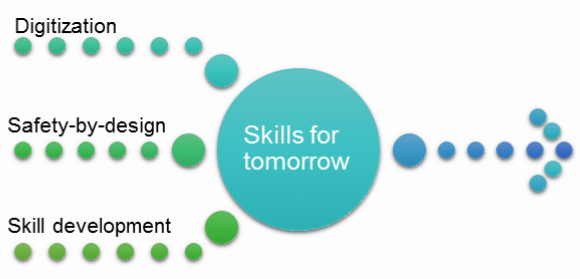Skills for tomorrow

India will see around 20-30 % decrease in headcount due to digitization as per Deloitte’s, Human Capital report, 2016. To put these numbers into context, this figure is going to be shaved off from the organized labour which constitutes less than 20% of the Indian economy.
And yet, all our skilled prowess with the pound-for-pound gains and shiny development drumbeat is set to the tune of an organized market. What will occur if this attrition suddenly unfolds within the near future?
Skill based consolidation carved into the formal economy will shape up the future of India’s development. This can also be seen in the light of how the Indian government is codifying labour laws and acts under one roof – the draft is currently available on labour ministry website till 31st July for the public.
The new skills revolution wouldn’t simply be decided by levels of education. It would demand soft skills of communication, appropriate experience and constant skill development based trainings – on-hand practical skills that act more like tools than rote knowledge application.
Another crucial factor would be the codification of OSH-EHS laws that might come into reality in the near future. These laws have slowly started to trickle into the rapidly flourishing formal economy, although, it isn’t by design. However, global corporate culture is making its presence felt and Indian companies are more than willing to compete with them in this department.
However, safety and health by design isn’t something that comes naturally to ‘risk seeking’ habits in India. Time saving shortcuts rule the roost and awareness, in general, is a difficult proposition for making an impact.

Unlocking future growth models in formal economies will be a deft combination of safety by design and digitization. Modern EHS systems are quietly leading this charge but the crucial component that plies it further remains missing – ‘ready to act’ human resources (as we had asserted in our earlier blog post).
Preparation of a future-ready workforce will require upskilling and maybe (to some extent) reskilling the older workforce. However, a majority of this manpower will arise from filling in new positions. This will allow the organizations to generate more human capital with diverse talent and a fresh pair of eyes to problem solving.
World Economic Forum findings suggest that younger workforce will face the challenges of the unknown – 65% of jobs of the future do not exist, today.
This isn’t like a manpower doomsday warning but simply a message which today’s management needs to listen to and respond. Job creation in modern times has been looked with a superior mindset than skill enhancement and upskilling. These equations will change as digitization slowly but firmly makes its way into the formal economy.
Rather than increasing the headcount, future workplaces will update their knowledge repository by adding actual value creators. True automation relies on principles of brevity and frugal intelligence.
Skills for tomorrow will delve deeper into the intelligence, safety and reduced time cycles for a job. Employment will be tied to it in the same way as electricity behaves – looking for the path of least resistance with maximum potential for ‘delivery’.


